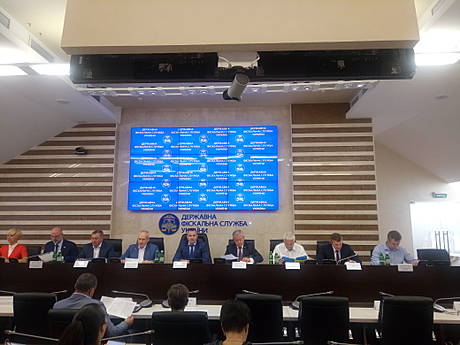
The business community insists that the state fiscal service should work with the business sector more closely and more carefully, taking into account businessmen's proposals in reforming the tax system. Entrepreneurs are still concerned about tax police inspections, technical problems with the system of VAT electronic administration, etc. As was proposed by the Ukrainian League of Industrialists and Entrepreneurs (ULIE), the tax authorities will analyze the dynamics of the impact of fiscal innovations (including an increase in minimum wages, fines, etc.) on production, especially for small businesses and the self-employed. In turn, the State Fiscal Service, which does not have the right to legislate, expects that business associations will provide public support for its steps to improve the system.
These issues were discussed at a meeting of the council on stimulating investment and entrepreneurial activity at the State Fiscal Service with the participation of the ULIE, business associations and business representatives.
"There is much work ahead: if we are talking about stimulating investment and entrepreneurship, then it is necessary to change the rules of the game with the focus on the development of the domestic market. In addition, the factor of households' solvency must be taken into account: if the state, in spite of this, is to increase excise taxes in the transparent sector of the economy, raising tariffs – this is counterproductive. We are all against the shadow economy, but we need to understand how such steps affect the business and the economy in general. Let's discuss the social and economic effect of such norms with the business associations, experts, and then introduce them," ULIE President Anatoliy Kinakh has said.
Acting head of the State Fiscal Service Myroslav Prodan said he is convinced that a number of initiatives have been implemented recently to improve the business climate in Ukraine, to make tax administration better and communication of entrepreneurship with tax authorities more effective. The main task was to launch an electronic register of VAT refunds. Some UAH 57.9 billion was refunded to the taxpayers this year alone. The dynamics of VAT overpayments have significantly decreased: from UAH 27 billion in 2014 to UAH 17 billion in 2017.
Among other things is the launch (before July 1 in the test mode) of the electronic VAT administration risk management system, the taxpayer's e-cabinet, where more than eight million users have already registered.
Prodan, in turn, stressed that the State Fiscal Service is deprived of the right to introduce legislative initiatives, saying that projects which businesses will benefit from are now "stuck" at the Finance Ministry. He asked for the support of the business community.
Participants in the council meeting also discussed the electronic system of management of VAT administration risks. Recently, taxpayers have started to receive receipts regarding the inconsistency of volumes of sales and volumes of supplies. The State Fiscal Service explained this fact by using different software products.
"Today, I do not see the risks of large-scale problems. Our system is almost ready. As you know, a relevant order has already been issued, we will hold a series of workshops and briefings in the regions," Prodan said.